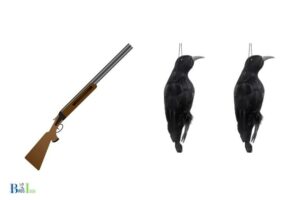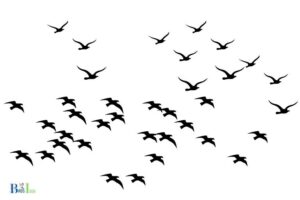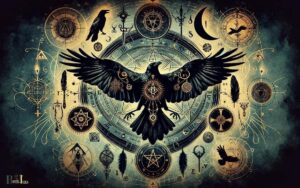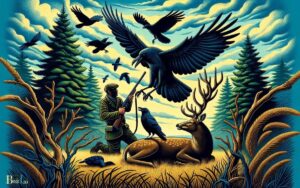What Does It Mean When a Crow Stares at You? Curiosity!
When a crow stares at you, it usually signifies curiosity, intelligence, and potential communication from the bird, as crows are known for their remarkable cognitive abilities and problem-solving skills.
They are known to recognize human faces and can remember individuals who have either helped or harmed them in the past.
When a crow stares at you, it’s likely assessing your intentions, trying to figure out if you pose any threat, or attempting to communicate with you in some way.
Crows are often misunderstood as symbols of bad luck or dark omens, but in reality, they are intelligent birds with complex social structures and remarkable cognitive abilities.
If a crow stares at you, it’s more likely trying to gather information about your character and intentions rather than bringing any harm or misfortune.
6 Interpretations: Meaning of a Crow Staring at You
| Interpretation | Explanation |
| Curiosity | The crow may simply be curious about you, observing your actions and behaviors out of interest. |
| Territory protection | It may be protecting its territory, especially if you are near its nest or young ones. |
| Intelligence | Crows are known for their intelligence, so the crow could be trying to figure out what you are or what you’re doing. |
| Food-seeking behavior | Crows are opportunistic feeders, and it may be watching you to see if you drop or offer any food. |
| Superstition | In some cultures, a crow staring at you is a sign of bad luck, but this is based on superstition rather than the crow’s intentions. |
| Social interaction | Crows are social birds and may be attempting to interact or communicate with you in some way. |
Key Takeaway
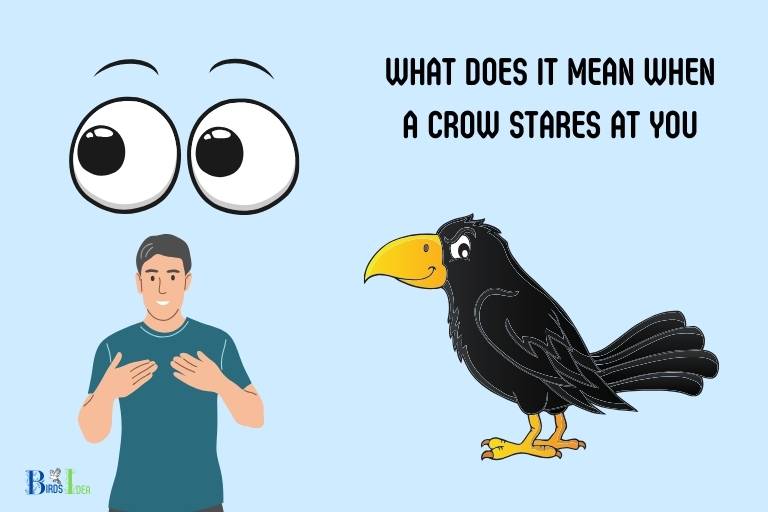
Five Facts About: Crow Staring at You
The Anatomy Of A Crow Stare: What Can You Learn From Their Body Language?
Bird watching has always been a hobby for many nature enthusiasts out there. It’s so calming to observe birds in their natural habitat, looking and flying freely.
Among all the birds, crows have impressed many with their intelligence and intriguing behavior.
But what does it mean when a crow stares at you? Let’s take a moment to decode this mystery, starting with understanding their body language.
Eye Contact: Understanding The Importance Of Direct Eye Contact With Crows
Eye contact is an essential indicator of most animals’ intent, including crows.
Here are some points to help you decipher the meaning behind their stare:
- Direct eye contact from a crow signals a warning sign. They perceive an immediate threat from the thing or person they are looking at.
- On the other hand, when a crow makes consistent eye contact while lowering its head, it indicates that they are investigating a tempting source of food.
- If you find yourself in an environment with multiple crows and one starts staring at you while the others continue their activities, that single crow might have found you threatening, and the other crows may have assigned him to keep an eye on you.
Posture: Decoding The Different Types Of Crow Stance And What They Mean
A crow’s stance can reveal a great deal about their demeanor, mood, and current intention.
Here is what their body postures mean:
- A confident crow will always stand tall with its head up high.
- A nervous crow, often seen in a group, stands with its head tilted downwards.
- If a crow flicks its tail while standing, it means that they sense danger or a potential threat and are attentive.
- A crow hopping around or using its beak to dig the ground indicates an urge to search for food in the area.
Vocalizations: Recognizing The Different Cawing Patterns Of Crows And What They Indicate
Crows use a variety of noises and sounds to communicate with one another.
Here are some of the sounds and what they mean:
- A series of loud, assertive caws can mean that they’re warning their flock of forthcoming danger or predators in the area.
- When a group of crows caws in a synchronized rhythm, they might have found something fascinating to investigate or a new source of food to look into.
- Crows can mimic other animals’ sounds like dogs, cats, and even human voices they’ve heard before. It’s their way of expressing themselves, alerting their flock to potential danger.
Crows are incredibly intelligent social birds with a fascinating set of behaviors. By closely observing their eye contact, posture, and vocalizations, one can determine their mood, intent, and current activity.
The Cultural Significance Of Crows: What Different Cultures Believe About Crow Behavior
When a crow stares at you, it can feel eerie, almost as if the bird is trying to communicate a message.
Crows have a rich cultural significance in many different societies, and their behavior is often viewed as telling of what’s to come.
We’ll delve into what different cultures believe about crow behavior, diving into native american mythology, ancient celtic culture, and asian and middle-eastern mythologies.
Native American Mythology: The Role Of Crows In Various Native American Myths
Native american mythology depicts crows as magical creatures that often act as messengers or symbols of change in the natural world.
Here are some of the key points:
- Native american folklore often depicts crows as shape-shifters and tricksters. They can take human form in order to interact and teach valuable lessons.
- For many tribes, crows symbolize death, transformation, and rebirth. They are often viewed as guiding spirits that can help people transition between life and the afterlife.
- Some native american cultures also associate crows with the concept of creation, seeing them as co-creators of the universe alongside humans and other animals.
Celtic Beliefs: The Significance Of Crows In Ancient Celtic Culture
Ancient celtic culture also has its fair share of stories featuring crows. In these tales, crows are often seen as symbols of death, misfortune, or war.
Here are some of the key points:
- The celts believed that crows could predict the weather and that their behavior could be used to determine future events.
- Crows were also associated with war and battle, believed to be flying over battlefields to scavenge food and keep watch over the dead.
- Despite their negative associations, crows were also associated with knowledge and wisdom. They were often depicted as clever creatures that could outsmart humans and other animals.
Eastern Mythologies: The Symbolism Of Crows In Asian And Middle-Eastern Mythologies
Crows have an intriguing symbolic significance in asian and middle-eastern mythologies. They are often portrayed as dark, powerful creatures that can bring about both good and bad fortune.
Here are some of the key points:
- In japanese culture, crows are revered as symbols of good luck and perseverance. They are commonly depicted as messengers of the gods and as protectors of warriors.
- In hindu mythology, crows are depicted as vengeful creatures that can bring bad luck and misfortune. They are often associated with death and decay.
- In middle-eastern cultures, the crow is often seen as a symbol of abundance and richness. They are thought to bring joy, wealth, and good luck to those who cross their path.
Overall, the cultural significance of crows varies widely across the world, but their behavior is usually seen as telling of future events and changes.
Whether viewed as magical messengers or dark omens, crows capture the imagination and continue to feature prominently in myths and folklore to this day.
What Does A Crow Stare At You Mean For Your Future: Understanding The Superstitions Surrounding Crow Behavior
Crows are a fascinating creature, often surrounded by superstitions and folklore. While some people view crows as a bad omen, others see them as harbingers of good luck.
Here we will delve into the many beliefs surrounding the behavior of crows and what they mean for your future.
Crows And Death: The Association Between Crows And Death In Various Cultures
Crows have been linked to death and the afterlife across the world, making people feel uneasy when they see one staring.
Here are some of the key beliefs related to this association:
- In many cultures, crows are thought to be messengers between the living and the dead.
- In some cultures, a crow cawing at night is seen as a warning of impending death.
- In others, crows are said to accompany the souls of the deceased to the afterlife.
Predicting The Future: The Belief That Crows Can Foretell Events, Good Or Bad
The ability of crows to predict future events has been a longstanding belief in many cultures.
Here are some key beliefs related to this association:
- If a crow flies into your home, it is said to be foretelling a change in your immediate future.
- Witnessing a crow swoop downwards is seen as a warning of bad news or upcoming danger.
- If a crow appears in your dreams, it could be a sign of impending good fortune.
Warnings And Omens: The Idea That Crows Can Warn Of Impending Dangers Or Provide Protection
Many believe that crows have the ability to predict danger and provide protection.
Here are some key beliefs related to this association:
- The presence of a crow when one is lost can be interpreted as a sign of welcome.
- Crows have been known to chase away predators, providing a protective aura to their surroundings.
- If you see a group of crows gathering, it is said to be a warning of impending danger or bad news.
The behavior of crows can be interpreted in many ways, based on a wide range of beliefs and superstitions.
Whether you view crows as a warning of danger, a messenger from the afterlife, or a predictor of future events, the sight of one staring can be an unsettling experience.
The Science Behind Crow Behavior: Decoding The Behavior Of These Intelligent Birds
Crows have fascinated humans for centuries with their mysterious behavior. These intelligent birds exhibit complex social behavior, remarkable problem-solving skills, and adaptability to different environments.
So, what does it mean when a crow stares at you? Let’s dive into the science behind crow behavior to find out.
Memory And Intelligence: The Cognitive Abilities Of Crows And What Sets Them Apart From Other Birds
Here are some things that set them apart from other birds:
- Crows have a remarkable long-term memory, capable of recalling objects and events for several years.
- They can also recognize individual humans, making it possible for them to form alliances or hold grudges against people who have previously harmed them.
- Crows possess great problem-solving skills and can use tools, such as sticks, to extract food from containers.
- They are among the few animals that can understand cause and effect relationships, a rare cognitive ability.
Socialization: The Complex Social Structures Of Crow Communities And How It Influences Their Behavior
Crows are very social birds and live in complex hierarchical communities.
Social interactions among crows include:
- Male crows defend territories and mate with females within their territories.
- Females in the community help each other raise their chicks.
- Crow families have long-lasting bonds, and sometimes two families merge to create a larger social unit.
- Crows engage in play behaviors, such as aerial acrobatics, which may help develop their cognitive abilities and establish trust among members of the community.
Environmental Adaptability: Crows Have Adjusted To Different Environments Over Time
Crows have adapted remarkably well to different environments over time.
Here are some examples of their adaptability:
- Carrion crows have learned to open walnuts by dropping them onto a busy road and waiting for a car to crack them open.
- Hooded crows in israel have learned to eat acorns by waiting for cars to run over them to crack them open.
- Urban crows often use streetlights to crack nuts and are known to assemble at specific locations at specific times to engage in this behavior.
- In japan, crows have adapted to living close to humans by using coat hangers to fish food out of vending machines.
Crows exhibit fascinating behavior that is a result of their impressive cognitive abilities, complex social structures, and adaptability to different environments.
Understanding these behaviors provides insight into the intelligence of these remarkable birds.
FAQ Of What Does It Mean When A Crow Stares At You
Why Do Crows Stare At You?
What Does It Mean When A Crow Caws At You?
Are Crows Good Or Bad Luck?
Do Crows Remember You?
What Should You Do If A Crow Follows You?
Conclusion
It’s intriguing to wonder what a crow staring at you might mean. While there is no one answer that can completely define this behavior, there are some common interpretations.
So, it’s possible that a crow may be recognizing you as a threat or maybe they are just observing you out of curiosity.
Some people believe that crows might be trying to communicate with us, or that they are trying to warn us of danger.
Regardless of what the cause might be, it’s important to stay calm and avoid showing any signs of aggression towards these intelligent animals.
It’s always remarkable to encounter wildlife in its natural habitat, so appreciate the moment and observe the crow back if you feel comfortable.
As always, remember to respect the birds and their behaviors when encountering them in the wild.

